The best foods to eat for every decade of your life
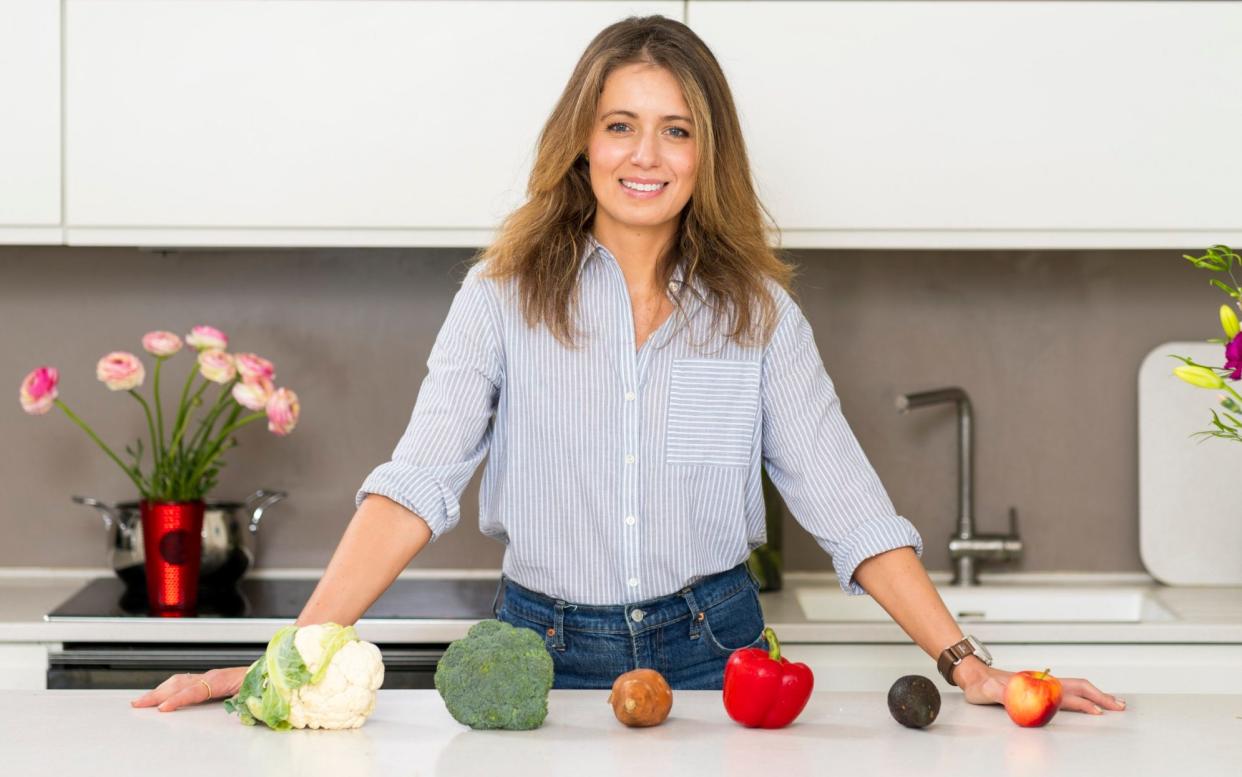
Have you ever stopped to think that how our body responds at 30 is drastically different to how it responds at 60? If not, then Dr Federica Amati is on a mission to change that. “My clients often say: I’m eating the same and doing the same exercise as I always have but I can’t seem to maintain my body as it was,” she says. “But the way we react to food changes through our life course, depending on things like hormones, and if we understand that we can be kinder to ourselves.”
Today, as the head nutritionist for Zoe, the nutrition science company set up by Prof Tim Spector, her job is to help us understand the impact of food on our wellbeing. There are certain points when our diet becomes ever more essential, she argues, and others when it’s natural to be in flux. Hence her first book, Every Body should Know This: The Science of Eating for a Lifetime of Health, offers a definitive guide on not just what to eat, but when and why.
As her book jacket informs us, the 36-year-old scientist holds a PhD in clinical medicine research from Imperial College London and a master’s in public health. Her knowledge extends beyond basic nutrition and into the research – which, she says, isn’t as complex or confusing as we might think – so what are the changes we need to be aware of and when do we need to step up our nutritional input?
Skip to:
Your 20s: Eat a rainbow of gut-loving plant foods
Key fact: Your gut microbes could lead you to love
Typically, in our 20s, we’ll be burning the candle at both ends and feel invincible, but this is also the time when we should be building healthy habits and capitalising on our ability to build muscle fairly easily as an insurance policy for our later years, so that means finding a sport that we love, switching to a Mediterranean-style diet and eating plenty of “high quality proteins”. It might not please you to hear this but “edamame and lentils have more protein per gram than meat”.
But surely we need meat, or at least dairy, to provide all the essential amino acids for health, the so-called “complete protein”? “Oh I love this,” she says. “That’s a massive myth. All plants contain all the essential amino acids. Every single plant is a complete protein. It’s true that animal protein is easier to absorb, but that doesn’t mean it’s better quality and with plants you’re getting other plant nutrients packaged in there that are essential for health like fibre and polyphenols (plant chemicals that protect against cancer).” A diverse array of plant fibres will also help keep your gut flora happy.
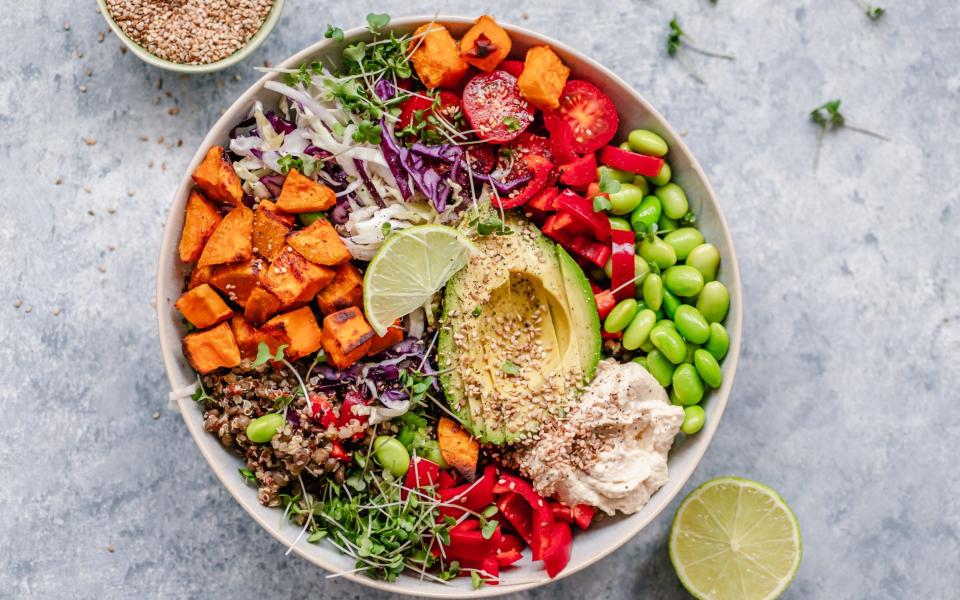
That we need to eat a variety of plants is not news to most of us, but one of the more surprising facts in the book is that our gut microbes could dictate who we fall in love with.
“Some of the gut microbes are translocated through the lymph to sites in the armpits and the groin. They help you choose your partner through chemical messages, like smell,” says Dr Amati. “The gut microbiome directly impacts the immune system, so that’s one of the ways we choose our mate because your immune systems must be compatible for a pregnancy to survive.”
Some of this might be a bitter pill to swallow, but it doesn’t hurt that Dr Amati exudes a light-up-the-room glamour and energy of the kind that makes you think: “I’ll have what she’s having.” As a pescatarian she no longer eats meat herself, but gives her kids high quality chicken and buys “high quality grass-fed steak” for her husband, the actor and model Paul Sculfor, 53.
Lunch, when we meet at 180 House, Soho House’s most recent London outpost, is an aubergine dip and rigatoni. Would she prefer brown pasta?” She wrinkles her nose. “It wouldn’t taste as good.” Ah taste, that often forgotten ingredient in today’s increasingly complex dietary landscape. Dr Amati might hold a host of qualifications in nutrition, but it’s her Italian heritage that has had the greatest impact on her food philosophy. “So many of my clients are too obsessed with a scale, they’ve forgotten food should be a pleasure.”
If, however, your idea of “pleasure” equals a pint of lager and a packet of crisps, it isn’t good news, at least not for would-be fathers.

Your 30s: Boost your fertility with seafood and wholegrains
Key fact: A man’s diet is as important as the woman’s when it comes to fertility
Fertility starts to decline from the age of 30, but since most of us now wait until this decade to start a family, we should eat to optimise our chances. One little-known fact is the importance of the man’s diet when it comes to fertility. Even Zoe’s co-founder and chief executive Jonathan Wolf, someone you might think knows a thing or two about nutrition, was incredulous to discover, on reading Dr Amati’s book, that the man’s diet and sperm quality was as important when it comes to conception and viability of an embryo as the woman’s.
“It’s very 50/50. Two to tango,” says Dr Amati. “In fact, recent scientific evidence suggests that the sperm, and thus paternal health, plays a much bigger role in healthy placental formation and function than the egg.”
A diet of beer and crisps is therefore not advised for couples trying for a baby.
It’s no secret that good nutrition starts in the womb, but Dr Amati could not be more emphatic. The first 1,000 days of a child’s life, from conception to the age of two, is a “momentous” time “yet it’s widely unknown and unspoken about outside scientific research”. Surprising perhaps, but not too controversial, it’s Dr Amati’s views on bottle feeding that can get her into hot water. In her book she writes: “I’ll go as far as to say that I think it’s irresponsible to encourage women to use replacement formula unless it’s necessary to do so.”
She does not say this to shame mothers – after all, she had to resort to top-up feeds with a bottle herself with her first child, when she had problems with her milk supply – but says parents should be transparently informed of health consequences.
She argues that human breast milk has a unique nutritional profile. It’s filled with fibres called oligosaccharides and “bioactive compounds” that prime the immune system and set a baby up for life. But in the UK we have the lowest rate of breastfeeding in the world, with only 1 per cent of mothers still exclusively breastfeeding at six months. “Women think that the health outcomes are the same and that’s when I get annoyed.”
But what of those mothers who struggle to breastfeed? In her book, Dr Amati foresees a future of “milk banks of human breast milk”; would she bring back wet nurses? “Wet nurses make more sense to me than powdered cow’s milk. Don’t get me wrong, as I said in the book, infant formula has a place. I just don’t like how much of a place it has. Many mothers won’t even consider breastfeeding. It’s not because of any other reason other than that we have been marketed formula milk. The formula industry is huge and powerful.”
Your 40s: Eat plenty of plant proteins like edamame and legumes
Key fact: Think of muscle as a huge organ that secretes hormones and keeps us healthy throughout our life
By the time we reach our 40s we’re technically past our physical peak, but it’s not too late to focus on “our biggest metabolically active organ: our musculoskeletal system”.
But if you do nothing to maintain it, it starts to deplete from our mid-30s on. We tend to think of muscles as a priority for bodybuilders or athletes. But muscles aren’t only about six-packs or posing in front of a gym mirror. We need muscle to live a healthy life.
“Skeletal muscle is a huge organ that secretes hormones, acting like a huge endocrine (hormonal) system that keeps us healthy. It’s important for a healthy metabolism, for mental health and sleep,” says Dr Amati. “Building up lean mass and healthier fat mass in your 30s and 40s is a good insurance policy for your 80s and 90s. I talk about health as the only currency that has a guaranteed return on investment. So if you spend your resources on improving your health, you’re definitely going to reap the benefits, there is no space where that doesn’t happen, both in the short and long term.”
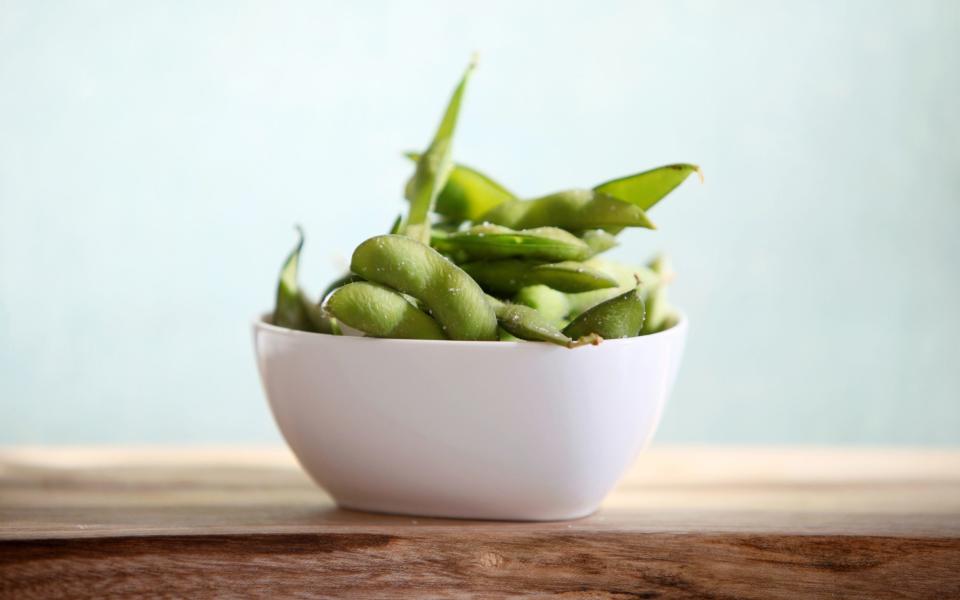
While maintaining muscle is a priority, there’s no need to start wolfing down chicken breasts. “A study that came out recently showed that high quality plant protein consumption was the marker for longevity,” says Dr Amati. “It goes back to what your aim is. If you’re trying to bulk up and be a bodybuilder then you might be better off eating eggs and chicken breasts all day. But if you are trying to lead a long and healthy life with decreased stress and disease and really good optimal skeletal muscle for everyday movement, then we’re looking at the quality of protein.”
More important than grams of protein per meal is our dietary pattern and that means eating a diverse diet. “Lots of different plants, nuts, seeds, legumes, lentils at every single meal. It’s that variety that ensures your body absorbs lots of different nutrients.”
Your 50s: Switch to a heart-healthy Mediterranean diet
Key fact: It’s not too late to avoid ‘Sniper’s Alley’ and turn your health around
We know which dietary patterns are associated with reduced risk of disease and a longer, healthier life. “I would say that I think having an omnivorous diet that’s very plant-led is the best approach for most people,” says Dr Amati. “A Mediterranean diet or one of the Blue Zone offshoots, which follow a similar pattern.
“The main thing is the majority of your plate is plant-based. Then, if you think of a pyramid, you’re adding some fatty fish like salmon, mackerel, anchovies or trout. Then smaller portions of your plate are fermented dairy or traditional dairy like yogurts, cheeses, a little bit of white meat or poultry or game. Red meat is at the top with the sweets. Then there’s also extra virgin olive oil which is the one food that has its own power added to this diet which is hard to swap out for other fats.”
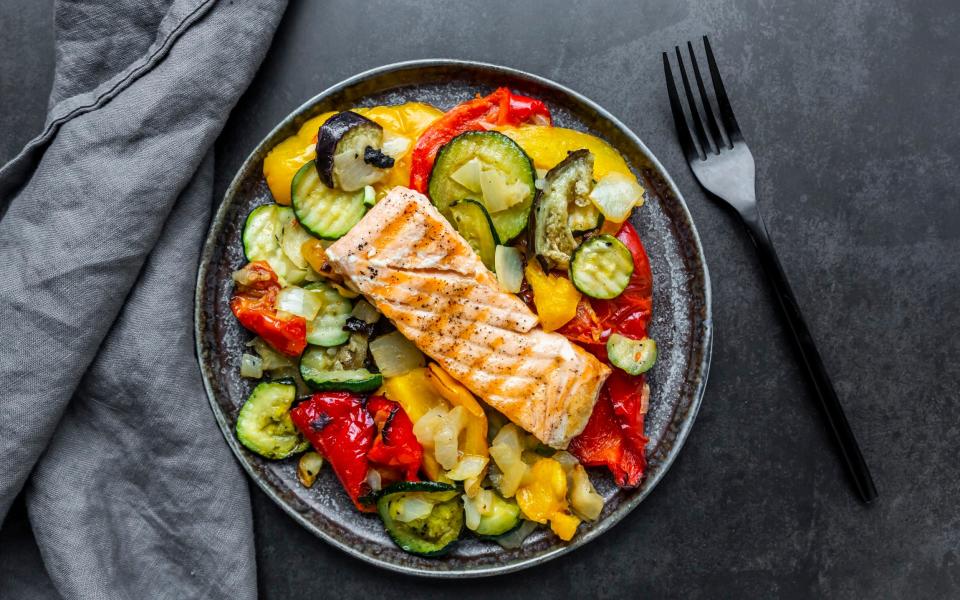
A number of doctors refer to the period between 50 and 70 as the grim sounding “Sniper’s Alley”. That’s because this is the time when the effects of the previous decades start to make themselves felt and people start to die. “Not from car accidents or terrible early-onset cancers but from preventable things like heart attacks, Type 2 diabetes and strokes, 80 per cent of which could be prevented with diet and lifestyle changes.”
But surely this is largely down to the genetic cards we’ve been dealt? “Our genes aren’t precise agents of change,” says Dr Amati. She likens them to musical notes in a “concerto” of our lives. “How softly or loudly the notes are played depends on the conductor, or in this case our diet and lifestyle.”
She has seen this play out first hand in her own family. Her beloved “papa” was diagnosed with colorectal cancer at 60, after years of struggling with his health. Dr Amati says her father stopped playing sports when her family moved to England from Italy, since his favourite activities were skiing, horse riding and swimming in the sea, none of which were accessible to him in London. His diet deteriorated and he gained weight.
“None of his healthcare professionals intervened to speak to him about his diet or the importance of movement. He was told if he could lose weight that would be ideal, but nothing to worry about.” This advice, or lack of it, would prove catastrophic. He died at just 63. “He didn’t get to meet my kids. The last thing he did before being hospitalised was go to my wedding. I’m so glad about that. But I wish I knew then what I know now, I could maybe have kept him here for longer,” she says sadly. “So much of what I do now is thanks to him.”
Meanwhile her grandfather, who lived with Dr Amati’s family from the age of 83 (“we’re Italian”), changed his ways after a doctor he’d got chatting to on a bus told him he’d better quit smoking and lose some weight if he wanted to see his children grow up. “He never saw him again, but it really hit home.” Amazingly, he followed the directive. “My grandfather died at 97 and he was alive and kicking until his last week and the difference between [him and my father] was diet and lifestyle.”
She wants us to understand that it’s never too late to turn things around.
“If you’re in your 40s or 50s and you have stress and visceral fat, and you’re metabolically messed up (with high cholesterol or blood sugar) that’s not a great place to be, you can’t expect to live until your 90s. But you can change at that age, you can still have this pivot, and that’s what happened to my grandfather. Obviously that’s just one example but there are loads of examples of people who turn their lives around in their 40s, 50s, 60s or 70s.
“I often hear that it’s very confusing. But when you actually look at the science, it’s quite clear and the science is pretty basic. It really is, it really is just eating whole foods and a real variety of plants. There is space for animal foods, eggs, fish, chicken and meat and dairy, but that’s just not the main part of your plate.”
60-plus: Increase fibre and cut back on alcohol
Key fact: You can still add seven years to your health span
“In your 70s you can still add an extra seven years to your health span,” says Dr Amati, quoting data from a recent UK Biobank study. But our physiology is changing and we need to be more aware of the impact of alcohol. “Our body gets less and less good at tolerating that level of inflammation from alcohol. So if you’re a habitual drinker I am a big advocate for reducing it, and for making it part of celebrations, as opposed to making it a daily thing. In the elderly, alcohol can cause what people think are the symptoms of dementia.”
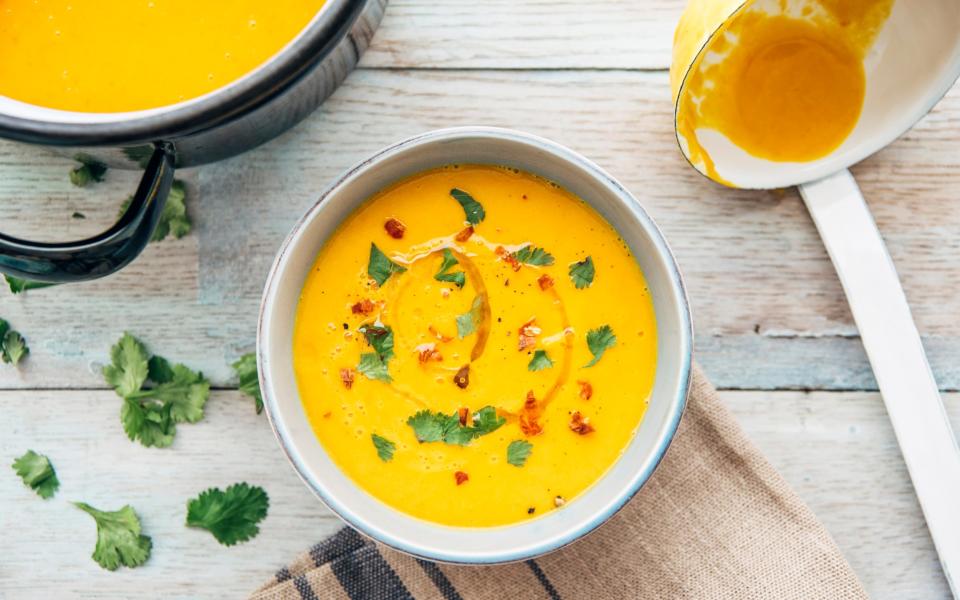
As our physiology changes so does our gut motility. “Older people should be eating healthy soups and fruit smoothies and purées.” Integrate prunes and soft fruits, to prevent chronic constipation, which can be really dangerous. “Things that are often accessible to older people, like biscuits and cakes, have no fibre.”
“But if you don’t like fruit and vegetables and don’t want to move, that’s fine, just know that you’ll probably get sicker and die earlier. My goal is to inform as many people as I can about what we do know about improving health with diet, so they can do what they want with it. What I don’t like is when people are misinformed or not informed at all.”
Fortunately we don’t need the expensive snake oil of longevity influencers, highly restrictive diets, or to spend a fortune on supplements.
“Cut smoking, reduce drinking, change your diet, and be active. Those four things are always the key drivers for health and if you can change those things you will live a longer and healthier life.”
Recommended
How to 'switch on' your anti-ageing genes – and live longer

 Yahoo News
Yahoo News 
